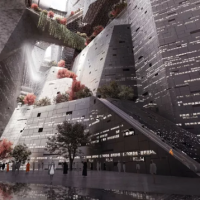When Tina LaRosa logged into a new Minecraft server this summer, she was a novice to the virtual world-building game.
But the 16-year-old high school sophomore was there for an important reason: to help launch a pilot of ExperienceCraft, a Minecraft server designed specifically with and for grieving youth between the ages of seven and 14.
The pilot was the product of a partnership between Experience Camps, a nonprofit that offers a one-week overnight summer camp for children who’ve experienced the death of a parent, sibling, or primary caregiver, and Connected Camps, an online learning platform powered by youth Minecraft experts. ExperienceCraft doesn’t try to mimic the summer camp, which is attended by a thousand youth annually. Instead, its goal is to provide an opportunity for grieving children to connect year-round as they play Minecraft.
The project was personal for LaRosa. Her mother died in 2019, and she attended Experience Camps in 2021 for the first time. LaRosa was invited by Experience Camps to join the organization’s youth advisory board for the pilot, in order to help shape the server. She lobbied for the server to become a space that focused on fun and connection while embodying Experience Camp values like kindness, respect, and being yourself. Everyone involved in creating the server had a similar goal, says Courtney Dubin, chief program officer of Experience Camps. (The project is supported by a $100,000 grant from the New York Life Foundation.)
Prior to the launch, ExperienceCraft invited hundreds of kids to join. About 60 kids showed up for the pilot. Upon entering the server, they encountered floating text outlining community norms, like being kind and respectful. Players were ushered into a central hub from which they could warp to other areas, like the memorial garden, where they could honor their loved one with unique builds; a survival area for facilitating teamwork and collaboration as they test their Minecraft skills in high-stakes situations; and a creative world for executing imaginative designs by themselves or with others. They could also communicate with each other on an affiliated Discord server for voice and chat messaging.

Credit: ExperienceCraft
“A lot of ExperienceCraft, kind of the beauty of it, is there’s no real pressure that it’s a grief community playing Minecraft,” says LaRosa. “Obviously everybody knows that fact, but we pushed the idea of ‘just make it fun first’ and focus on the connections and friendships that could be made.”
LaRosa says that peer relationships with someone who understands what it’s like to endure grief as a child or teen can offer comfort and healing. In the U.S., an estimated 5.6 million children will lose a parent or sibling by age 18. At least 250,000 kids, many of them Black, Indigenous, and children of color, have lost a primary or secondary caregiver as a result of COVID-19.
The scale of youth grief can’t be matched by the available resources, whether that’s camps, nonprofit programming, or counseling. That’s why Experience Camps saw Minecraft, which has 600 million registered users, as a way to meet children where they are — on one of the world’s most popular video games. As ExperienceCraft expands and welcomes more players to the server, its designers aim to build on early successes and reach grieving youth who might otherwise feel alone.
Building a Minecraft server for grieving kids
Katie Salen Tekinbaş, Connected Camps’ co-founder and chief designer, says she wanted to create a sense of belonging for players who might feel isolated in their grief: “What would it mean to provide a space for them where they really felt connected and a sense of belonging to a community that they had a chance to help develop and grow over time?”
Drawing on feedback from LaRosa and other youth advisory board members, as well as Connected Camps’ insights from creating a thriving server, Salen Tekinbaş and her design team were very intentional about ExperienceCraft’s features.
First, players’ parents or caregivers complete a registration process that includes information about their loss. While moderators don’t verify those details because of privacy concerns, they do confirm the identity of the child to ensure no one is entering the server with a false or fake identity. The server is safelisted, which means a parent’s email is required to join and players must be approved by an administrator. Players also remain anonymous. When they arrive in ExperienceCraft, a thorough tutorial outlines expectations and invites them to be a “great community member.”
The server has important protections for players in ExperienceCraft. Volunteer and paid moderators have undergone background checks and received crisis and grief training. Some are teens or college-age mentors from Experience Camps and Connected Camps. They can view all commands and messages in real time, including those sent privately on both the Minecraft and Discord servers.

Credit: ExperienceCraft
To further create a sense of safety, players can’t join each other’s Zen spaces without an invitation. Players also can’t edit someone’s build in the memorial garden, which means that deeply personal expressions of grief can’t be accidentally or purposely violated. In the survival and creative worlds, moderators can see who built something and who altered it, making it easy to hold players accountable for any hurtful or destructive behavior. If a player acts out, a moderator is trained to take them to an area named The Resort for a cool-down period. The idea is to address the emotions behind their actions rather than severely sanctioning them. There is a protocol for moderators to reach out to a player’s caregiver if necessary. So far, moderators have seen few conflicts so far.
LaRosa says the guardrails and clearly stated norms have created a safe space for players to have fun, even as the topic of grief surfaces in unexpected ways. Her favorite part of ExperienceCraft are the build battles where players get a set amount of time to construct something on the same theme. In one such contest, a player decorated their treehouse with purple flowers to honor their loved one’s favorite colors. LaRosa says the participants were friendly and supportive of each other’s creations.
In a recent holiday campfire challenge, players built virtual objects like a snowman and flames that turned into a house. In the memorial garden, one player constructed a dining room table set in memory of having a sit-down dinner. Sometimes players will talk about what they’ve built with the group or in a private chat. Other times, it’s cathartic for players to simply share what they’ve created without going into details.
“Not unlike camp itself, it’s a great mixture of fun but also opportunities to express that grief if you’d like to,” says Fox Besch, a 17-year-old Experience Camps participant who joined the server as a volunteer during the pilot.
Opening the doors of ExperienceCraft
Besch, also a member of Experience Camp’s youth advisory board, is eager to expand the server’s reach. It’s currently open Friday through Sunday from 5 p.m. to 8 p.m. ET. A longtime Minecraft player who’s spent time in several other servers, including the popular Hypixel, Besch says ExperienceCraft offers something special to youth grappling with grief.
Ultimately, Dubin would like to see thousands of players join ExperienceCraft, but there are practical barriers, even if the server is arguably more accessible than an annual sleep-away camp. Players need access to Minecraft Java or Bedrock editions (which costs as much as $29.99), and a Mac or PC computer, or a tablet, iPad, or Playstation, XBox, or Switch gaming console. Phones and Chromebooks cannot run the necessary software to participate. Discord software, which is used for simultaneous voice and text chat, can be run on most devices. Of course, players need a reliable internet connection, too.
Since reaching children regardless of their family’s income and location is a priority for Experience Camps, Dubin says the nonprofit is identifying youth programs that serve bereaved children and can provide technical resources and in-person support that some players might not have.
One promising example is how the advisory board and pilot included players from the Center for Grieving Children, a program of the Boys & Girls Clubs of the Fox Valley in Wisconsin. Erin Hollister, the center’s director, says the players benefited from the peer support aspect of ExperienceCraft. Hollister also emphasizes the importance of restoring a grieving child’s sense of ordinariness following a traumatic experience over which they had no control. Minecraft feels normal to kids, because they’ve played that game or another like it, she says.

Credit: ExperienceCraft
Hollister and a volunteer were trained as moderators. She believes that any expansion should include support from adults who’ve undergone background checks and have appropriate training to understand how grief affects children.
Experience Camps is currently working with Boys & Girls Clubs of America to explore rolling out the server in clubs across the country. ExperienceCraft will soon launch in the Boys & Girls Club of Menasha, also in Wisconsin, which will offer a sense of how easily other clubs can access the server. Players will use club computers and log into ExperienceCraft during the club’s programming hours. Additionally, Experience Camps is identifying partners in smaller school-based programs that serve grieving children.
Dubin recalls a recent conversation about how alone bereaved kids can feel, particularly during the holidays.
“For some kids, there is nothing out there,” says Dubin, noting that camp may not be open when they need it, or a counselor may not be available. “But if [ExperienceCraft] is here, they can go here, and be around other people who get it.”
You can find a guide for navigating grief at Experience Camps’ website. If you’re a caregiver or child dealing with a mental health crisis, you can reach the 988 Suicide and Crisis Lifeline at 988; the Trans Lifeline at 877-565-8860; or the Trevor Project at 866-488-7386. If you need to talk to someone, text “START” to Crisis Text Line at 741-741. Contact the NAMI HelpLine at 1-800-950-NAMI, Monday through Friday from 10:00 a.m. – 10:00 p.m. ET, or email [email protected]. If you don’t like the phone, consider using the 988 Suicide and Crisis Lifeline Chat at crisischat.org. Here is a list of international resources.
Source : New Minecraft server helps grieving kids feel less alone














